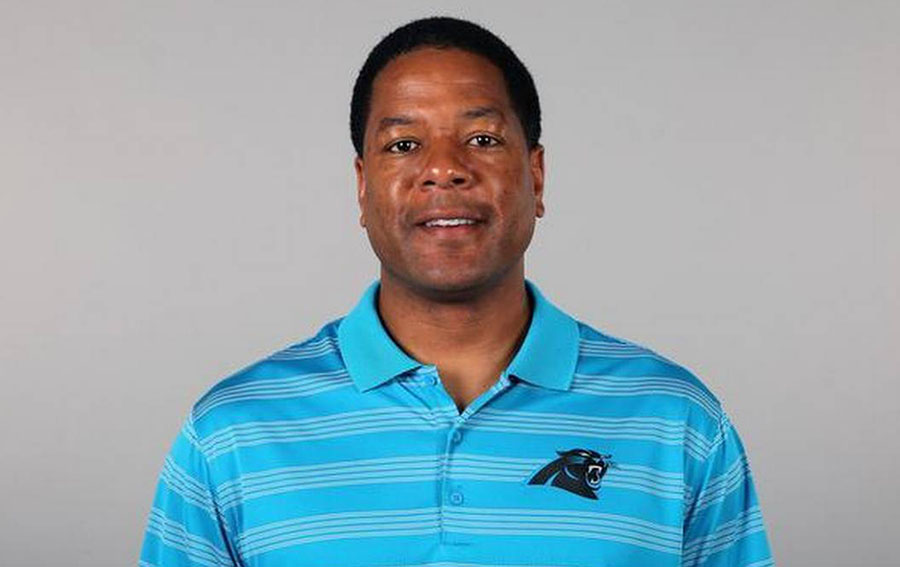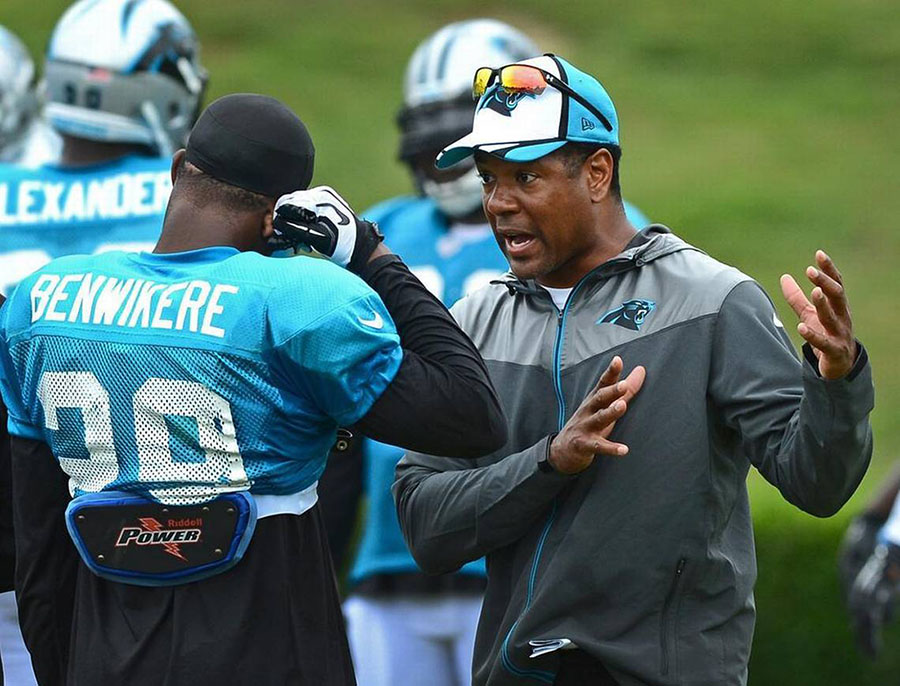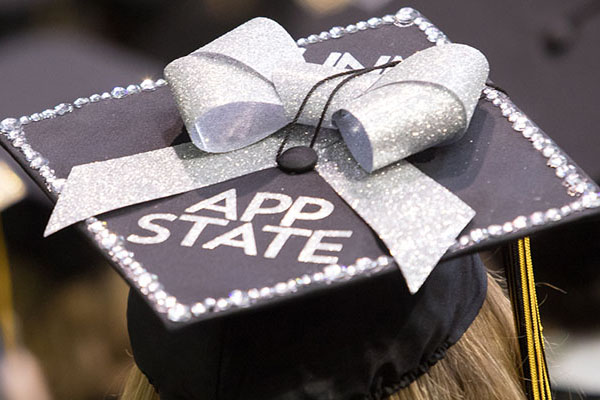Like so many young men growing up in the Queen City, Steve Wilks ’92 dreamed of playing on the game’s grandest stage. His skills and determination helped mold him into a standout defensive back in a talent-rich program at West Charlotte High School. Today he is assistant head coach and defensive backs coach of the National Football League’s (NFL) Carolina Panthers. The team plays in Charlotte’s Bank of America Stadium.
“I had the desire to play college football pretty early in high school,” Wilks said following a recent Panthers off-season practice. “When you see your teammates play well and start to get scholarship offers, the process becomes very intriguing for you.”
Many students at Appalachian State University can trace their first exposure to the university back to a trusted high school teacher or coach. Wilks’ relationship with Bruce Hardin, his head football coach at West Charlotte, provided reassurance that becoming a Mountaineer was the right decision.
“Coach Hardin played at App State and he sent many of my teammates to Boone,” Wilks said. “Guys like Richie Melchor went to App and had success and that stood out to me. Coach Hardin had a good relationship with Appalachian football Coach (Sparky) Woods (1984-88) and his entire staff. That helped me feel very at home with the recruiting process.”
Wilks played as a member of Appalachian’s defensive backfield from 1987-91. He tallied 103 career stops for the Black and Gold while intercepting four passes and blocking four kicks during his career.
Woods left Boone following the 1988 season to become head coach at the University of South Carolina. Appalachian then hired a well-connected head coach with a power football pedigree in Jerry Moore. Experiencing a transition at the top helped Wilks discover a passion for football that stretched beyond the playing field.
“We had been recruited by Coach Woods and we had relationships with those guys. There was a bit of resentment toward Coach Moore at first,” Wilks said.
Wilks has built a career in coaching largely on relationships and rewarding the value every player brings to a program. The foundation of this philosophy can be traced back to witnessing Coach Moore and his staff turn an uneasy transition into championship success.
“Once we opened up and listened to Coach Moore, we were able to buy in to the way he did things very quickly,” Wilks explained. “He would never discredit any player and he believed everyone had something they could contribute.”
After college, Wilks blew his first whistle as an assistant coach at Charlotte’s Harding High School in 1992. Following a brief stint playing for the hometown Charlotte Rage of the Arena Football League, Wilks resumed coaching for good. He became defensive coordinator at nearby Johnson C. Smith University, sparking a successful coaching career that has included nine stops in the college ranks and three NFL assignments.
“I feel like I learned how to treat players when I was at Appalachian,” Wilks said. “Coach Woods always addressed us by calling us men, because that’s the way he wanted us to think of ourselves – as young men – and that’s how he expected us to act. Coach Moore treated everyone the same. That, to me, is why his walk-on program was so successful. Those kids knew that he would give them a chance to prove themselves.”
Wilks rose through the NCAA Division II ranks as a defensive mastermind and turned that experience into his first head coaching position at Savannah State in 2000. He returned to Boone as defensive backs coach for the 2001 season, reuniting with his former college coach.
“Coach Moore taught me a lot about organizational skills. He paid so much attention to details. He also made sure we, as coaches, were trying to bring in the right players for our system and philosophy,” Wilks recalled. “He knew we needed guys that could play but he wanted high character guys as well.”
In 2006, Wilks stepped into the NFL as defensive backs coach for the Chicago Bears where he worked under defensive coordinator Ron Rivera. He later followed his pro mentor to San Diego and eventually back to Charlotte when Rivera became head coach of the Carolina Panthers in 2012.
“Spending time around guys like Coach Moore and Coach Rivera has been beneficial because the confidence you gain working for them becomes key in your preparation. You just want to be a sponge around guys like that. Both are similar in that they want talented players to be a part of their teams, but those players have to fit the overall philosophy of what the organization is about,” Wilks explained.
Wilks recently enjoyed his second trip to the Super Bowl as the Panthers reached the NFL’s title game for just the second time in franchise history. The accomplishment of reaching such a coveted destination is thrilling, but Wilks said winning the game is why you make the trip.
“The Super Bowl provides for a lot of distractions but football is still football. You want to win the game,” he said. “We had the advantage of having several guys on staff that had been through the experience before so we knew what to expect. We had a great week of preparation leading up to the game. Things just didn’t go our way that day.”
Spending over a decade in the college game prior to stints with three NFL franchises gives Wilks a keen understanding of the mental makeup of today’s football player. He sees many similarities in what drives players at both levels.
“College players that want to play at the next level are self-motivated. They will do what it takes to get better each day. Sometimes guys in the NFL can get a little complacent once they have made it. It’s our job to find ways to stimulate them and help them keep their edge. We talk about staying great and committing daily to learning the game as if they don’t know it,” he said.
As Wilks and the Panthers prepare to defend their NFC championship, Wilks balances team and individual goals. The same kid who used to dream of life in the NFL while playing on the fields of Charlotte now envisions taking his first steps as a head coach at the game’s highest level. His upbringing in the game keeps him grounded and focused on the task at hand.
“There is no secret that my goal is to be a head coach in the NFL, but it’s very important to take care of what is in front of you,” Wilks said. “I’ve learned throughout the years that you pay attention to what you should be doing and good things will happen. For now, my job is to make sure the Carolina Panthers have the best secondary in the NFL and that’s what I intend to do.”
Finding football life close to his college roots has helped Wilks keep tabs on the Mountaineers. He played alongside then walk-on Scott Satterfield in 1991 and has coached with or against several members of the current App State staff.
“I am so impressed with where things sit with the program now,” Wilks said, “and I’m certainly happy for Coach Satterfield. They made the transition well to the FBS [Football Bowl Subdivision] and the Sun Belt [Conference.] My time at Appalachian will always be special to me. I learned time management, structure and organization for both my personal and professional life while I was there. Most of all, I earned my degree from Appalachian State and I could not have achieved anything in my career without that.”
What do you think?
Share your feedback on this story.






![How NCInnovation Is Rethinking Economic Development in North Carolina [faculty featured]](/_images/_posts/2026/02/rethinking-economic-development-600x400.jpg)







